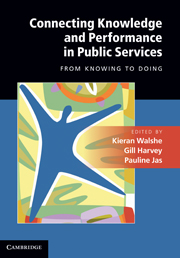Book contents
- Frontmatter
- Contents
- List of figures
- List of tables
- List of boxes
- Notes on contributors
- Foreword
- 1 Introduction: knowledge and performance – theory and practice
- 2 Knowledge from inspection: external oversight and information to improve performance
- 3 How is information used to improve performance in the public sector? Exploring the dynamics of performance information
- 4 Citizens, users or consumers: the voice of the public and its influence on improving performance
- 5 Competition and choice: the place of markets in connecting information and performance improvement
- 6 The role of corporate governance and boards in organisational performance
- 7 Change at the top: connecting political and managerial transitions with performance
- 8 The role of leadership in knowledge creation and transfer for organisational learning and improvement
- 9 Process Improvement and Lean Thinking: using knowledge and information to improve performance
- 10 Using evidence: how social research could be better used to improve public service performance
- 11 Absorptive capacity: how organisations assimilate and apply knowledge to improve performance
- 12 Knowing through doing: unleashing latent dynamic capabilities in the public sector
- 13 Conclusions: a puzzle, three pieces, many theories and a problem
- Index
- References
10 - Using evidence: how social research could be better used to improve public service performance
Published online by Cambridge University Press: 05 July 2011
- Frontmatter
- Contents
- List of figures
- List of tables
- List of boxes
- Notes on contributors
- Foreword
- 1 Introduction: knowledge and performance – theory and practice
- 2 Knowledge from inspection: external oversight and information to improve performance
- 3 How is information used to improve performance in the public sector? Exploring the dynamics of performance information
- 4 Citizens, users or consumers: the voice of the public and its influence on improving performance
- 5 Competition and choice: the place of markets in connecting information and performance improvement
- 6 The role of corporate governance and boards in organisational performance
- 7 Change at the top: connecting political and managerial transitions with performance
- 8 The role of leadership in knowledge creation and transfer for organisational learning and improvement
- 9 Process Improvement and Lean Thinking: using knowledge and information to improve performance
- 10 Using evidence: how social research could be better used to improve public service performance
- 11 Absorptive capacity: how organisations assimilate and apply knowledge to improve performance
- 12 Knowing through doing: unleashing latent dynamic capabilities in the public sector
- 13 Conclusions: a puzzle, three pieces, many theories and a problem
- Index
- References
Summary
Introduction
Public service organisations are preoccupied with understanding how good performance can be achieved: what matters is what works. But delivering high-quality services requires a far wider array of evidence than just that on effectiveness – we need, for example, knowledge about the scale, source and structuring of social problems; practical ‘know-how’ to support effective programme implementation in local contexts; and insights into the relationships between values and policy directions.
Research can make an important contribution to the development of public services and policy programmes, and it can enrich debates about the nature of social problems and what works in addressing them. However, such positive research impacts are far from routine, and the impact of research is not always positive. Negative impacts may, for example, arise in situations where tentative or highly specific findings are seized upon too readily or applied too widely.
Despite this, the overzealous use of research is not normally considered to be the main problem. Quite the opposite; researchers and others are often disappointed that clear findings are overlooked or ignored when decisions are made about the direction and delivery of services. This view is supported by many studies that have found that practice often lags behind the best available evidence about what works and that it may remain out of step for quite some time.
- Type
- Chapter
- Information
- Connecting Knowledge and Performance in Public ServicesFrom Knowing to Doing, pp. 199 - 225Publisher: Cambridge University PressPrint publication year: 2010
References
- 4
- Cited by



